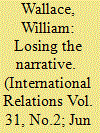|
|
|
Sort Order |
|
|
|
Items / Page
|
|
|
|
|
|
|
| Srl | Item |
| 1 |
ID:
089379


|
|
|
|
|
| Publication |
2009.
|
| Summary/Abstract |
Burma faced independence in 1948 as a deeply divided country. The British had ruled the area, which now was declared the 'Union of Burma' under two entirely different administrative systems. 'Burma Proper' was basically populated by the ethnic Burmans, Arakanese, Mons and Delta Karens, whereas the 'Frontier Areas' were populated by the Shan people, Salween Karens, Kachins, Karennis, Chins and various subgroups of the aforementioned. The same year, as independence was granted, the Union of Burma plunged into a civil war, which still continues. This article discusses the ethnic categories created by the colonial authorities and looks into how these ethnic categories have been - and continue to be - imagined, invented, manipulated and politicised. The article looks into how the Burmese authorities dealt with the ethnic diversity in the first constitution of 1947 by dividing the country into ethnically based 'states' and 'divisions' and how the international community of today continues supporting these colonial categories.
|
|
|
|
|
|
|
|
|
|
|
|
|
|
|
|
| 2 |
ID:
153645


|
|
|
|
|
| Summary/Abstract |
The United Kingdom’s awkward relationship with the countries on the European continent reflects the ambiguity of its national identity, wavering between European engagement and the English-speaking peoples, as much as differences over economic interests. The founding narrative of West European integration, after the Second World War, has also weakened with generational change, the end of the Cold War and eastern enlargement. Developing persuasive new narratives both for the United Kingdom and the European Union (EU) are necessary but difficult tasks for continuing cooperation.
|
|
|
|
|
|
|
|
|
|
|
|
|
|
|
|
| 3 |
ID:
172177


|
|
|
|
|
| Summary/Abstract |
This paper presents a case study of the Earth Liberation Front (ELF), based on interviews of the group’s former affiliates. It examines the role of credit claims in organizing this underground leaderless resistance group’s activity. In addition to the external signaling functions of credit claims—demonstrating capability, issuing demands, and soliciting public support—credit claims serve a movement-building role in the ELF. By issuing credit claims in “aboveground” fora that other cells are known to read, ELF cells with no direct links are able to communicate information to one another. Credit-claiming communiqués serve four organizing functions for the ELF. They constitute the ELF underground as an imagined community, recruit new cells, set agendas for future actions, and enforce operational standards of behavior via an informal “peer review” process. This study of the ELF suggests broader insights, including possible organizing techniques that may be observed in white supremacist and Islamist cases.
|
|
|
|
|
|
|
|
|
|
|
|
|
|
|
|
|
|
|
|
|